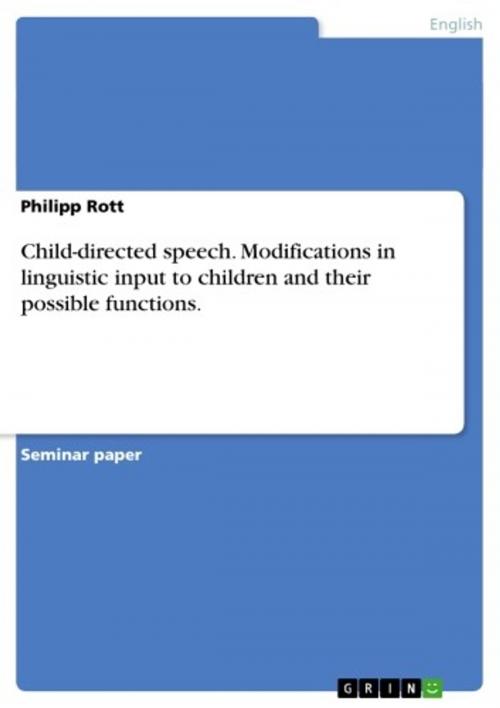Child-directed speech. Modifications in linguistic input to children and their possible functions.
Nonfiction, Entertainment, Drama, Anthologies| Author: | Philipp Rott | ISBN: | 9783638228107 |
| Publisher: | GRIN Verlag | Publication: | November 10, 2003 |
| Imprint: | GRIN Verlag | Language: | English |
| Author: | Philipp Rott |
| ISBN: | 9783638228107 |
| Publisher: | GRIN Verlag |
| Publication: | November 10, 2003 |
| Imprint: | GRIN Verlag |
| Language: | English |
Seminar paper from the year 2001 in the subject English Language and Literature Studies - Linguistics, University of Duisburg-Essen (Foreign Languages), course: Hauptseminar Language Acquisition, SS 2001, 67 entries in the bibliography, language: English, abstract: Anyone who has seen and heard a child speak his/her first words and who has noticed how much language determines the progress of a child in becoming independent of his/her parents and in mastering interaction with others must have wondered why it is that children can fulfil such an obviously complex task in such a surprisingly little time with seemingly little effort. It appears almost impossible that the child can achieve so much all by himself/herself. Thus, quite frequently, people consider the linguistic input that is available to the child as a crucial factor for the child's language acquisition: 'It is no wonder that he has learned to speak so fast, with so many people around speaking to him and showing him how to speak!' is an utterance I heard quite often when my son was at the age when he started producing his first words. But did I really help him to learn language? Of course, I noticed my own speech modifications as well as that of other people when conversing with him. But does this special register, which nearly everyone (at least in our western culture) seems to adapt when adressing children, really make a difference? Do we even teach our children to speak? I will not attempt to answer these questions in the present paper, as much more research is needed in this area. However, I want to give an overview on the different features of the language used when adressing children. It will be shown on which principles of modification these features are based and which functions they might serve for the child. Moreover, it will be argued that some features of the speech to children may possibly facilitate language acquisition, but that the language used to them is not necessarily simplified language.
Seminar paper from the year 2001 in the subject English Language and Literature Studies - Linguistics, University of Duisburg-Essen (Foreign Languages), course: Hauptseminar Language Acquisition, SS 2001, 67 entries in the bibliography, language: English, abstract: Anyone who has seen and heard a child speak his/her first words and who has noticed how much language determines the progress of a child in becoming independent of his/her parents and in mastering interaction with others must have wondered why it is that children can fulfil such an obviously complex task in such a surprisingly little time with seemingly little effort. It appears almost impossible that the child can achieve so much all by himself/herself. Thus, quite frequently, people consider the linguistic input that is available to the child as a crucial factor for the child's language acquisition: 'It is no wonder that he has learned to speak so fast, with so many people around speaking to him and showing him how to speak!' is an utterance I heard quite often when my son was at the age when he started producing his first words. But did I really help him to learn language? Of course, I noticed my own speech modifications as well as that of other people when conversing with him. But does this special register, which nearly everyone (at least in our western culture) seems to adapt when adressing children, really make a difference? Do we even teach our children to speak? I will not attempt to answer these questions in the present paper, as much more research is needed in this area. However, I want to give an overview on the different features of the language used when adressing children. It will be shown on which principles of modification these features are based and which functions they might serve for the child. Moreover, it will be argued that some features of the speech to children may possibly facilitate language acquisition, but that the language used to them is not necessarily simplified language.















